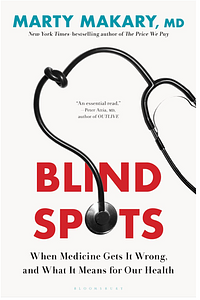Take a photo of a barcode or cover
74 reviews for:
Blind Spots: When Medicine Gets It Wrong, and What It Means for Our Health
Marty Makary
74 reviews for:
Blind Spots: When Medicine Gets It Wrong, and What It Means for Our Health
Marty Makary
challenging
informative
medium-paced
informative
reflective
medium-paced
I found the audiobook, read by the author, to be very informative and engaging. The author takes us through some notable incidents in history where common medical belief was wrong and led to disastrous outcomes. He then asks what about today - what is a commonly held medical belief today that is wrong? He urges the readers to not just accept what the establishment tells you, but to question it. However there is no “how” - how can the average person be informed if so many articles/experts are wrong? “Do your own research” sounds nice, but the research could also be wrong or influenced one way or another. So where does that leave us?
informative
slow-paced
informative
inspiring
reflective
Very informative, will definitely make you think and do research for your health.
informative
informative
fast-paced
informative
slow-paced
challenging
informative
fast-paced
So interesting and totally up my alley.
Makary looked at a number of recommendations in medicine that originated and/or persisted in society as a result of group think and minimally examining and/or challenging blind spots. He also talked about the limitations to speaking out against commonly accepted beliefs and the challenges that poses as well. That portion was honestly the scariest part. There is so much control in healthcare companies, the American government, and funders of research that it is hard to avoid blind spots and even harder to course correct long-accepted errors.
Things I flagged for interest:
Ch 3:
We don't need AI, we just need I.
Ch 4:
Early peanut exposure resulted in an 86% reduction in peanut allergies by the time a child reached age 5
WIC excludes peanut butter, despite those qualifying for WIC are at a much higher risk of developing a peanut allergy, and thus stand to benefit the most from early introduction
Ch 11:
Ovarian cancer risk reduction through the removal of the fallopian tubes - also interesting that the procedure currently requires advance consent (after years of nonconsensual sterilization), but this is inconvenient as it is a potentially great add-on procedure if other abdominal surgery is needed
Ch 14:
It was wild to read about so many policies and pressures suppressing information from doctors (in an effort to reduce misinformation) - policies American doctors share with doctors in North Korea
Societies are defined by what speech they do not permit
Ch 15:
Research on cases of transgender children - clusters, not randomly in the population - many had underlying mental health disorders - clusters often included girls who binge on social media - this research challenged a gender-affirming view - if transgender was strictly biological, one would expect a more random distribution, not a social contagion
Makary looked at a number of recommendations in medicine that originated and/or persisted in society as a result of group think and minimally examining and/or challenging blind spots. He also talked about the limitations to speaking out against commonly accepted beliefs and the challenges that poses as well. That portion was honestly the scariest part. There is so much control in healthcare companies, the American government, and funders of research that it is hard to avoid blind spots and even harder to course correct long-accepted errors.
Things I flagged for interest:
Ch 3:
We don't need AI, we just need I.
Ch 4:
Early peanut exposure resulted in an 86% reduction in peanut allergies by the time a child reached age 5
WIC excludes peanut butter, despite those qualifying for WIC are at a much higher risk of developing a peanut allergy, and thus stand to benefit the most from early introduction
Ch 11:
Ovarian cancer risk reduction through the removal of the fallopian tubes - also interesting that the procedure currently requires advance consent (after years of nonconsensual sterilization), but this is inconvenient as it is a potentially great add-on procedure if other abdominal surgery is needed
Ch 14:
It was wild to read about so many policies and pressures suppressing information from doctors (in an effort to reduce misinformation) - policies American doctors share with doctors in North Korea
Societies are defined by what speech they do not permit
Ch 15:
Research on cases of transgender children - clusters, not randomly in the population - many had underlying mental health disorders - clusters often included girls who binge on social media - this research challenged a gender-affirming view - if transgender was strictly biological, one would expect a more random distribution, not a social contagion





